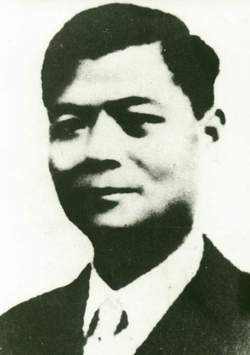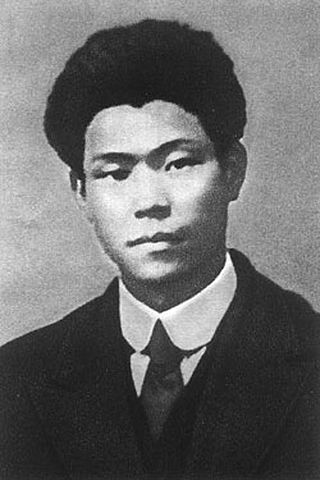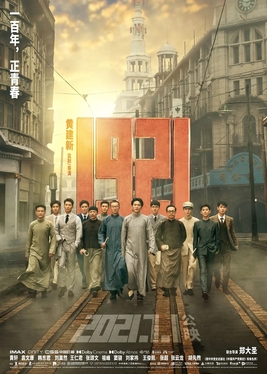
Chen Duxiu was a Chinese revolutionary socialist,educator,philosopher and author,who co-founded the Chinese Communist Party (CCP) with Li Dazhao in 1921. From 1921 to 1927,he served as the Communist Party's first general secretary. Chen was a leading figure in both the Xinhai Revolution that overthrew the Qing dynasty and the May Fourth Movement for scientific and democratic developments in the early Republic of China. After his expulsion from the CCP in 1929,Chen was for a time the leader of China's Trotskyist movement.

Zhang Guotao was a Chinese revolutionary who was a founding member of the Chinese Communist Party (CCP) and rival to Mao Zedong. During the 1920s he studied in the Soviet Union and became a key contact with the Comintern,organizing the CCP labor movement in the United Front with the Kuomintang. From 1931 to 1932,after the Party had been driven from the cities,Zhang was placed in charge of the Eyuwan Soviet. When his armies were driven from the region,he joined the Long March but lost a contentious struggle for party leadership to Mao Zedong. Zhang's armies then took a different route from Mao's and were badly beaten by local Muslim Ma clique forces in Gansu. When his depleted forces finally arrived to join Mao in Yan'an,Zhang continued his losing challenge to Mao,and left the party in 1938. Zhang eventually retired to Canada,in 1968. He became a Christian shortly before his death in Scarborough,Ontario,in 1979. His memoirs provide valuable and vivid information on his life and party history.

Li Lisan was a Chinese politician,member of the Politburo,and later a member of the Central Committee.
The 28 Bolsheviks were a faction in the early Chinese Communist Party (CCP). The faction was formed among Chinese Communists studying at the Sun Yat-sen University in Moscow during the late 1920s and early 1930s. They received their nickname because of their strong support for the orthodox political positions advocated by Joseph Stalin and Pavel Mif. The leaders of the faction included Wang Ming,Bo Gu,Luo Fu,He Zishu,Wang Jiaxiang,and Shen Zemin. Sun Yat-sen University closed in 1930 and the students made their way back to China.

Dong Biwu was a Chinese communist revolutionary and politician,who served as acting Chairman of the People's Republic of China between 1972 and 1975.

Wang Ming was a senior leader of the early Chinese Communist Party (CCP) and the mastermind of the famous 28 Bolsheviks group. Wang was also a major political rival of Mao Zedong during the 1930s,opposing what he saw as Mao's nationalist deviation from the Comintern and orthodox Marxist–Leninist lines. According to Mao on the other hand,Wang epitomized the intellectualism and foreign dogmatism Mao criticized in his essays "On Practice" and "On Contradiction". The competition between Wang and Mao was a reflection of the power struggle between the Soviet Union,through the vehicle of the Comintern,and the CCP to control both the direction and future of the Chinese Communist Revolution.

Xiang Zhongfa was a Chinese socialist who was one of the early senior leaders of the Chinese Communist Party (CCP).

The Shanghai massacre of 12 April 1927,the April 12 Purge or the April 12 Incident as it is commonly known in China,was the violent suppression of Chinese Communist Party (CCP) organizations and leftist elements in Shanghai by forces supporting General Chiang Kai-shek and conservative factions in the Kuomintang. Following the incident,conservative KMT elements carried out a full-scale purge of communists in all areas under their control,and violent suppression occurred in Guangzhou and Changsha. The purge led to an open split between left-wing and right-wing factions in the KMT,with Chiang Kai-shek establishing himself as the leader of the right-wing faction based in Nanjing,in opposition to the original left-wing KMT government based in Wuhan,which was led by Wang Jingwei. By 15 July 1927,the Wuhan regime had expelled the Communists in its ranks,effectively ending the First United Front,a working alliance of both the KMT and CCP under the tutelage of Comintern agents. For the rest of 1927,the CCP would fight to regain power,beginning the Autumn Harvest Uprising. With the failure and the crushing of the Guangzhou Uprising at Guangzhou however,the power of the Communists was largely diminished,unable to launch another major urban offensive.
The 6th Central Committee of the Chinese Communist Party was in session from 1928 to 1945,during most of the Chinese Civil War,and during the Second Sino-Japanese War. It held seven plenary sessions in this period. It was formally preceded by the 5th Central Committee of the Chinese Communist Party. It was the first central committee to have Mao Zedong as a high-ranking member. It was succeeded by the 7th Central Committee.
The 5th Central Committee of the Chinese Communist Party was in session from 1927 to 1928. It was set into motion by the 5th National Congress. It was followed by the 6th Central Committee of the Chinese Communist Party.
The history of the Chinese Communist Party began with its establishment in July 1921. A study group led by Peking University professors Chen Duxiu and Li Dazhao to discuss Marxism,led to intellectuals officially founding the Chinese Communist Party (CCP) in July 1921. In 1923,Sun Yat-sen invited the CCP to form a United Front,and to join his nationalist party,the Kuomintang (KMT),in Canton for training under representatives of the Communist International,the Soviet Union's international organization. The Soviet representatives reorganized both parties into Leninist parties. Rather than the loose organization that characterized the two parties until then,the Leninist party operated on the principle of democratic centralism,in which the collective leadership set standards for membership and an all-powerful Central Committee determined the party line,which all members must follow.

Chen Tanqiu was a Chinese politician and founding member of the Chinese Communist Party (CCP).

Cai Hesen was an early leader of the Chinese Communist Party (CCP),and a friend and comrade of Mao Zedong. Cai was born in Shanghai but grew up in Shuangfeng County in Hunan Province of China. He helped Mao organize the Changsha New People's Study Society. In 1919 he went to France on the Work-Study program,and his letters of advocacy were important in convincing Mao of the Bolshevik revolutionary approach. On his return to China,he was an important leader and organizer for the young Communist Party,spent several years in Moscow,and returned to China again in 1931. While organizing revolutionary activity in Hong Kong,he was arrested and given over to Canton authorities,who executed him in August 1931.

Li Da was an early Chinese Marxist philosopher and founding member of the Chinese Communist Party. He was heavily involved in bringing Marxism into China by translating Marxist literature into the Chinese language,editing,writing books,and teaching,among other things. He subscribed to and spread Orthodox Marxism throughout his life.

He Shuheng was a Chinese Communist revolutionary,born in Ningxiang,Hunan province.

The 2nd National Congress of the Chinese Communist Party was held in the Shanghai International Settlement at the apartment of Li Da of 625 Pude Lane,South Chengdu Road,between July 16 and July 23,1922. The congress was attended by 12 representatives,representing 195 members of the Chinese Communist Party (CCP). The congress succeeded the 1st National Congress of the Chinese Communist Party and preceded the 3rd National Congress of the Chinese Communist Party.

The Wuhan Nationalist government,also known as the Wuhan government,Wuhan regime,or Hankow government,was a government dominated by the left-wing of the Nationalist or Kuomintang (KMT) Party of China that was based in Wuhan from 5 December 1926 to 21 September 1927,led first by Eugene Chen,and later by Wang Jingwei.

The 3rd National Congress of the Chinese Communist Party was held in Guangzhou at 31 Xuguyuan Road between June 12 and June 20,1923. It succeeded the 2nd National Congress of the Chinese Communist Party and preceded the 4th National Congress of the Chinese Communist Party. The congress was attended by 40 representatives across China and Moscow representing 420 party members of the Chinese Communist Party (CCP).

1921 is a 2021 Chinese historical film directed by Huang Jianxin and Zheng Dasheng and starring Huang Xuan,Ni Ni,Wang Renjun and Liu Haoran. The film premiered in China on 1 July 2021,to commemorate the centennial year anniversary of the Chinese Communist Party.

Chen Qiaonian was a Chinese revolutionary and early leader of the Chinese Communist Party.

















